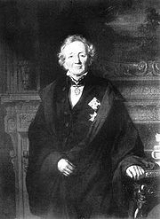
Leopold von Ranke
Overview
Germany
Germany , officially the Federal Republic of Germany , is a federal parliamentary republic in Europe. The country consists of 16 states while the capital and largest city is Berlin. Germany covers an area of 357,021 km2 and has a largely temperate seasonal climate...
historian
Historian
A historian is a person who studies and writes about the past and is regarded as an authority on it. Historians are concerned with the continuous, methodical narrative and research of past events as relating to the human race; as well as the study of all history in time. If the individual is...
, considered one of the founders of modern source-based history
History
History is the discovery, collection, organization, and presentation of information about past events. History can also mean the period of time after writing was invented. Scholars who write about history are called historians...
. Ranke set the standards for much of later historical writing, introducing such ideas as reliance on primary source
Primary source
Primary source is a term used in a number of disciplines to describe source material that is closest to the person, information, period, or idea being studied....
s (Empiricism
Empiricism
Empiricism is a theory of knowledge that asserts that knowledge comes only or primarily via sensory experience. One of several views of epistemology, the study of human knowledge, along with rationalism, idealism and historicism, empiricism emphasizes the role of experience and evidence,...
), an emphasis on narrative history
Narrative history
Narrative history is the practice of writing history in a story-based form. It can be divided into two subgenres: the traditional narrative and the modern narrative....
and especially international politics (Aussenpolitik
Political history
Political history is the narrative and analysis of political events, ideas, movements, and leaders. It is distinct from, but related to, other fields of history such as Diplomatic history, social history, economic history, and military history, as well as constitutional history and public...
).
Ranke was born in Wiehe
Wiehe
Wiehe is a town in the Kyffhäuserkreis district, in Thuringia, Germany. It is situated 24 km south of Sangerhausen, and 32 km north of Weimar....
, then part of the Electorate of Saxony
Electorate of Saxony
The Electorate of Saxony , sometimes referred to as Upper Saxony, was a State of the Holy Roman Empire. It was established when Emperor Charles IV raised the Ascanian duchy of Saxe-Wittenberg to the status of an Electorate by the Golden Bull of 1356...
. He was educated partly at home and partly in the Gymnasium of Schulpforta. His early years engendered a life-long love of Ancient Greek
Ancient Greek
Ancient Greek is the stage of the Greek language in the periods spanning the times c. 9th–6th centuries BC, , c. 5th–4th centuries BC , and the c. 3rd century BC – 6th century AD of ancient Greece and the ancient world; being predated in the 2nd millennium BC by Mycenaean Greek...
and Latin
Latin
Latin is an Italic language originally spoken in Latium and Ancient Rome. It, along with most European languages, is a descendant of the ancient Proto-Indo-European language. Although it is considered a dead language, a number of scholars and members of the Christian clergy speak it fluently, and...
and of the Lutheran
Lutheranism
Lutheranism is a major branch of Western Christianity that identifies with the theology of Martin Luther, a German reformer. Luther's efforts to reform the theology and practice of the church launched the Protestant Reformation...
Church.
Quotations
Die glücklichsten Zeiten der Menschheit sind die leeren Blätter im Buch der Geschichte.![]()
Translation: The happiest times of humanity are the blank pages in the book of history.
[...] nicht das Amt die Vergangenheit zu richten, die Mitwelt zum Nutzen zukünftiger Jahre zu belehren, sondern bloß zu zeigen, wie es eigentlich gewesen ist.![]()
Translation: [The historian has] not the duty to judge the past, nor to instruct one's contemporaries with an eye to the future, but rather merely to show how it actually was.
Er, der Geschichte Bären auf Politik bilden möchte, muß sicher sein, daß seine Geschichte objektiv ist; andernfalls beeinflußt Geschichte nicht Politik, aber eher Politik Geschichte.![]()
Translation: He who wants to make history bear on politics must be sure that his history is objective; otherwise, history will not influence politics, but rather politics history.

